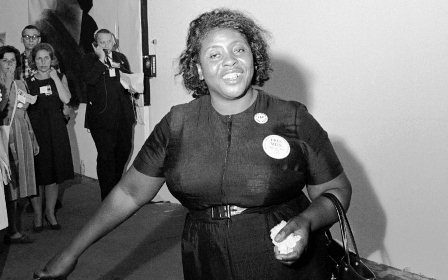
Fannie Lou Hamer, a Mississippi sharecropper, changed this nation’s perspective on democracy. She worked for political, social and economic equality for herself and all African Americans. She fought to integrate the national Democratic Party, and became one of the first black delegates to a presidential convention.
Fannie Lou Townsend was born in Montgomery County, Mississippi, in 1917, the youngest of 20 children. By the age of six she was working in the cotton fields. Although she dropped out of school at age twelve, she continued her education with Bible study. At twelve, her parents accumulated enough money to rent a farm and buy mules and tools for farming.
A white neighbor poisoned their mules, and they were forced into even greater debt. On the plantation where she worked she met her future husband, Perry Hamer. Her Christian faith was a source of strength for her throughout her life, and she became known in the civil rights movement as a captivating preacher and singer, inspiring others with her moral and physical courage.
In 1962, the Student Nonviolence Coordinating Committee (SNCC) came to Hamer’s town and encouraged blacks to register as voters. Hamer volunteered, even though she had not previously known that it was a Constitutional Right for blacks to vote. After registering herself and working with SNCC, she lost her job, received death threats, and was severely beaten by the police in an effort to intimidate her.
Hamer helped found the Mississippi Freedom Democratic Party (MFDP) in 1964 because blacks were not allowed in the all-white regular party delegation. Although Lyndon Johnson refused to seat the MFDP, the Democrats agreed that in the future no delegation would be seated from a state where anyone was illegally denied the right to vote.
Hamer also worked towards achieving financial independence for blacks. In 1969, she helped to start Freedom Farms Corporation, which lent land to blacks until they had enough money to buy it. She worked with the National Council of Negro Women, organized food co-operatives, and helped convene the National Women’s Political Caucus in 1970.
Though Hamer wanted children, a white doctor had sterilized her without permission, so she adopted daughters instead. In her last years, she received many honors and awards. Engraved on her headstone in her hometown of Ruleville, Mississippi, are her famous words: “I’m sick and tired of being sick and tired.”

